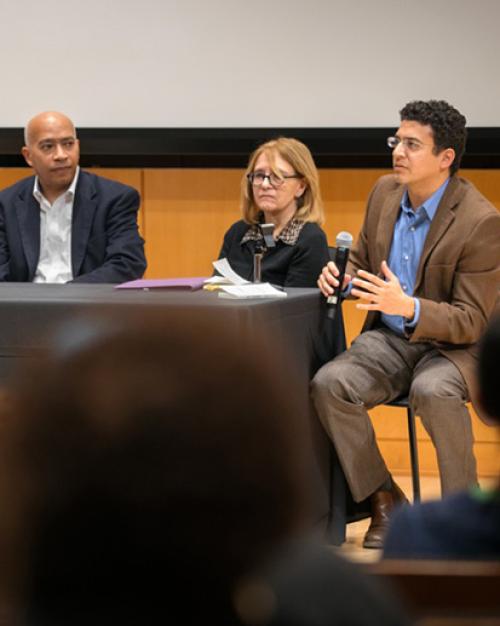“Today, our political order faces new threats, not unlike the totalitarianism of the 20th century,” declares Timothy Snyder in his new book, “On Tyranny: Twenty Lessons from the Twentieth Century.” On Oct. 30, Cornell students, faculty and members of the Ithaca community gathered to discuss Snyder’s work as part of a community book read, which drew more than 100 people.
The book was chosen not for its perfection or because the organizers agreed with it, but “because it is a short, provocative book that can generate thoughts, reflections and questions to engage with – and more importantly, to engage with our current political situation,” moderator Paul Fleming, professor of German studies and comparative literature and director for the Society for the Humanities, said in his introduction.
Introductory remarks were made by four panelists: Mabel Berezin, professor of sociology; Jonathan Boyarin, the Mann Professor of Modern Jewish Studies and director of the Jewish Studies Program; Kevin Gaines, the W.E.B. Du Bois Professor of Africana Studies and chair of the Africana Studies and Research Center; and Aziz Rana, professor of law.
Although Rana found the book valuable, he said it fundamentally misdiagnoses the causes of what we would think of as American tyranny.
“The U.S. has embedded within it deep hierarchies that are class-based and racially grounded,” he said. “These deep hierarchies are actually sustained by the way the institutions themselves are structured, which is to allow empowered minorities – business and racial elites, not minorities as we often think of them – to maintain minority rule in a society that is, in fact, not fully democratic.
“So the historic function of insurgent social movements [like the labor and civil rights movements] has been really to democratize American life,” he said.
Berezin assigned Snyder’s book to her class this semester on Fascism, Nationalism, and Populism; she focused her remarks on Snyder’s first chapter on “anticipatory obedience,” in which he urges readers not to obey before you need to. Berezin urged the audience to engage instead in anticipatory disobedience. Engage in civic activities like running for office, she said.
“[Cultivate a] heightened awareness of the little ways we consent and ‘obey in advance’ even if we do not mean to, but simply suffer a ‘failure of attention,’” she said. “I am asking us all to pay attention, to be aware of the content of our day-to-day public commitments because by the time that we have to worry about our commitments and obedience it will be too late.”
To Gaines, Snyder’s belief in the resilience of American institutions and that liberal democratic values will save us is “wishful thinking.” White supremacy “has been at the center of U.S. politics for generations, in recent decades driving the GOP anti-government, anti-civil rights agenda, and underwriting the draconian policies of cuts in anti-poverty programs and federal anticrime legislation passed by the Democratic administration of [President] Bill Clinton,” he said.
Gaines added that “the lesson for us today, and in the weeks to come, in public, and in interpersonal dealings with others, is to speak out against the racist speech and actions that increasingly surround us, and to borrow a lesson from Snyder, to not be afraid to stand out in doing so.”
In his remarks, Boyarin called on the audience to do the “hard work of memory.” Despite our loyalty to “the image of a common humanity and to the dream of its unity, such grand visions are rarely the basis for effective politics in the present,” he said.
Memory is “a process of continual opening simultaneously toward our own ancestors and toward all of our contemporaries,” Boyarin said. “The more I know about my ancestors, the more receptive I can be to learning about yours.”
Referring to Snyder’s claim that our own conformity is a key ingredient of the victory of tyranny, Boyarin said, “doing the hard work of memory and not the easy work of nostalgia or ‘ressentiment’ (assigning blame for one’s frustration) is one way to overcome the slide toward such conformity.”
The event was organized by the Jewish Studies Program, the Society for the Humanities, the Africana Studies and Research Center and American Studies Program.
This article originally appeared in the Cornell Chronicle.




